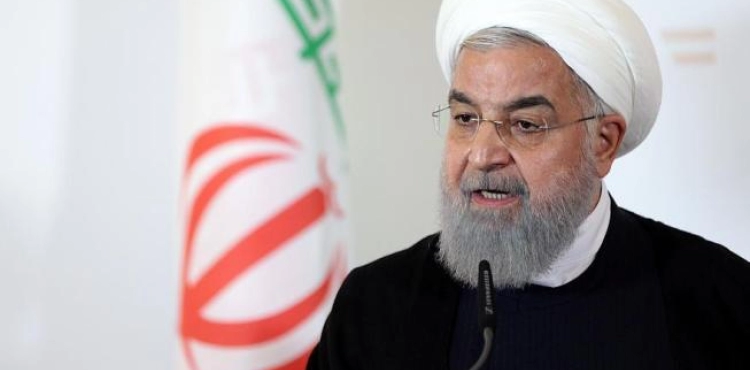Iranian President Hassan Rouhani said on Tuesday Iran was ready to negotiate with Washington on the condition that it lifted sanctions against the Islamic republic.
"The Islamic Republic of Iran is in negotiations, and if the United States really wants to discuss it, it must first of all lift all sanctions," Rowhani said in comments broadcast live on state television.
Tensions between Iran and the United States have escalated since President Donald Trump unilaterally announced in May 2018 his country´s withdrawal from the nuclear deal and reimposed sanctions on the Islamic Republic as part of its "extreme pressure" campaign.
After 12 months, Iran responded by suspending some of its commitments under the agreement.
The situation was almost out of control because ships were attacked, downed by drones and oil tankers seized.
"If they want talks, they should pave the way for that," Rouhani said, calling on the US administration to apologize to the Iranian people, Fars News Agency reported.
Responding to Rouhani´s comments, US disarmament envoy Robert Wood said President Donald Trump was "ready to sit down and discuss with Iran," but added: "But we are not sure that Iran really wants to engage in this debate."
Iranian Foreign Minister Mohammad Javad Zarif said on Monday he had rejected an invitation to meet Trump despite threats of sanctions.
The New Yorker magazine said the meeting was scheduled to take place at the White House, which did not confirm the information. On July 31, Washington imposed sanctions on Zarif.
"Peace with Iran is the foundation of all peace," Rouhani said. "War with Iran is the mother of all wars."
"Whether they want to join the nuclear deal or not, it´s up to them," Rowhani said.
"All sanctions should be lifted," he said, accusing the United States of "economic terrorism" by obstructing the import of food and medicine.
Sitting next to Zarif, Rouhani defended the minister, who has been criticized by militants for his role in the deal, from which the Americans unilaterally withdrew.
"We had a lot of economic victories (following the deal) that outraged some," he said, referring to the benefits the deal has had in Iran´s transport and banking sectors.
Rouhani said the United States made a mistake by believing that "everything will end" for Iran after "some planned street riots" in December 2017.
At the time, Iran witnessed days of bloody protests that reportedly began over austerity measures.
"This has put the Americans in a trap. They thought Iran´s regime was weak," he said. "They said ´Iran has reached a level so that if we push it another push, everything will end´."
He said that this push by the "advocates of war" disappointed Trump and led to the decision to withdraw from the nuclear deal.
Rouhani stressed that in any possible negotiations the Americans should be ready to negotiate rationally.
"If you want security and your soldiers are safe in the region, security in exchange for security, you cannot disrupt our security and expect security for yourself, as well as peace in exchange for peace and oil for oil," the official IRNA news agency reported.
"Peace for peace and oil for oil," he said. "You cannot say you will prevent our oil from being exported."
"The Strait versus the Strait. The Strait of Hormuz cannot be open to you and the Strait of Gibraltar cannot be so to us."
Iran has also been locked in a confrontation with US ally Britain since the Royal Navy helped seize an oil tanker carrying Iranian oil off Britain´s Gibraltar on July 4.
Weeks later, the Revolutionary Guards seized a British-flagged oil tanker in the Strait of Hormuz, the strategic passage from which about a third of the world´s seaborne oil supplies pass daily.
Separately, the Iranian Defense Ministry on Tuesday unveiled three new precision-guided missiles, proving that it is ready to defend itself against the "malice and intrigue" of the United States, Iranian Defense Minister Amir Hatami said.












